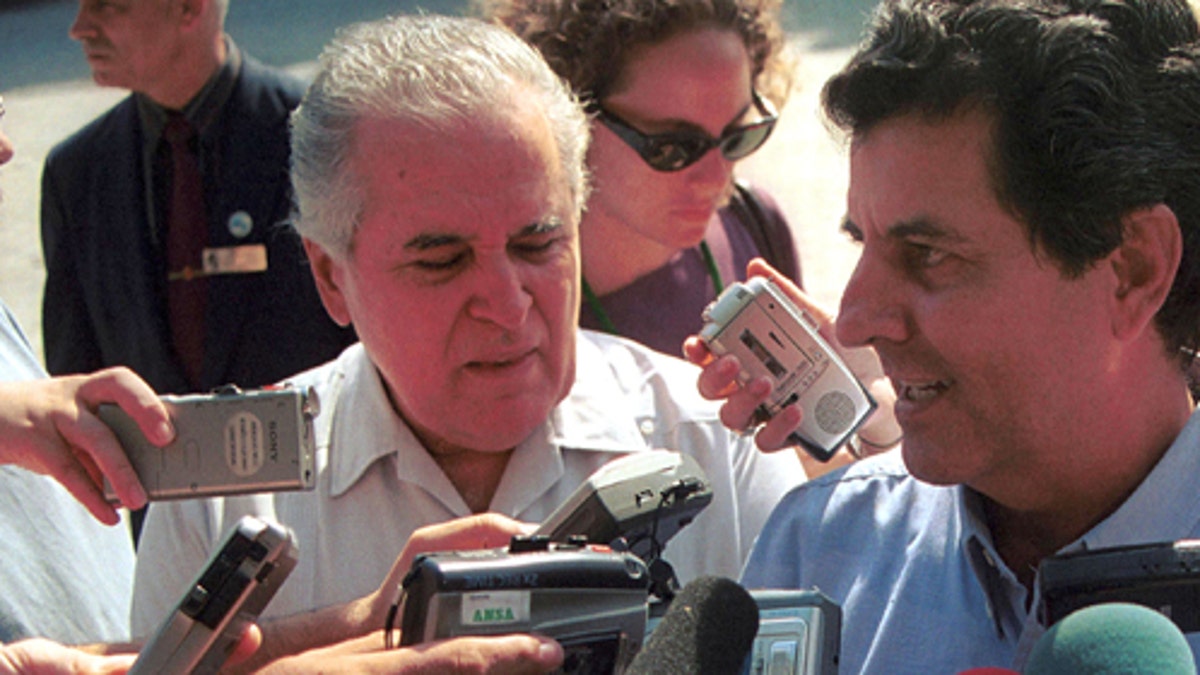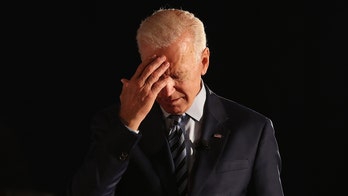
405296 02: Cuban dissidents Elizardo Sanchez (L) and Osvaldo Paya (R) speaks to the news media after a talk with former U.S. President Jimmy Carter May 13, 2002 in Havana, Cuba. The dissidents spoke with Carter about Cuba's current human rights situation and asked him to start a dialogue with the U.S. Carter is the first U.S. president, in or out of office, to visit Cuba since Castro came to power in 1959. (Photo by Jorge Rey/Getty Images)
Presumptive GOP presidential nominee Mitt Romney joined the call Monday for a transparent investigation into the death of Cuban dissident Oswaldo Paya, who lost his life over the weekend in a car crash at age 60.
“The cause of freedom in Cuba has lost one of its strongest voices and respected leaders yesterday,” Mitt Romney said in a statement. “The international community should demand that the facts concerning Paya’s death be accurately determined and that the surviving witnesses be protected.”
Florida Senator Marco Rubio, who is also Republican, also released a statement prodding foreign governments to pressure Cuba to investigate Paya’s death openly.
“As we try to learn more about the circumstances of Payá’s death, it is critically important that the international community join those inside Cuba in pressuring the regime to be forthcoming with the truth,” Rubio said in statement.
President Barack Obama also mourned Paya’s death, though he did not intimate that the Cuban government might be responsible for it or call for an investigation.
“The President's thoughts and prayers are with the family and friends of Oswaldo Payá, a tireless champion for greater civic and human rights in Cuba,” the White House Press Office said in a statement. “The United States will continue to support the Cuban people as they seek their fundamental human rights.”
Though Cuba has lost its prominence on the U.S. foreign policy agenda since the fall of the Soviet Union, the Communist government remains a deeply emotional issue for Americans of Cuban heritage, most of whom are concentrated in the swing state of Florida.
Romney and other Republican leaders pounced on Obama earlier this month for saying that he didn’t view Venezuela as a serious national security threat, a view unpopular among Cuban-Americans, many of whom resent the role President Hugo Chávez has played in propping up the Cuban dictatorship.
Paya gained international fame as the lead organizer of the Varela Project, a signature-gathering drive asking authorities for a referendum on guaranteeing rights such as freedom of speech and assembly. The initiative launched a decade ago was seen as the biggest nonviolent campaign to change the system Fidel Castro established after the 1959 Cuban revolution.
Paya died Sunday afternoon along with another dissident, Harold Cepero Escalante, in the crash in La Gavina, 500 miles (800 kilometers) east of the capital. Authorities said the driver of the rental car carrying Paya and Cepero lost control and struck a tree. Fellow passengers Jens Aron Modig, a Swedish citizen, and Angel Carromero, a Spaniard, were hospitalized with minor injuries and later released.
It was not immediately clear who was behind the wheel.
Cuban exile groups in the United States demanded a thorough and transparent investigation, as did the Christian Liberation Movement founded by Paya, according to the Miami Herald.
Paya’s daughter, Rosa Maria Paya, says the car crashed because of another car
“The information we received from the boys in the car with him is that a car was trying to push them off the road, ramming them at every moment,” Paya said, according to the Herald. “So we think — we are convinced — that they wanted to harm them and ended up killing my father.”
Cuban state media reported the deaths without mentioning that Paya and Cepero were government opponents. Official media rarely refer to dissidents except to excoriate them as "counterrevolutionaries" financed by Washington.
Family members, dissidents and Roman Catholic Church officials gathered at Paya's house in the Cerro neighborhood of Havana on Monday to await the arrival of his body, which was being brought from the eastern province of Granma for burial.
"I want to say thank you for all the messages, the phone calls and the people who have come to express their support in these tragic moments," Ernesto Martini, a close associate of Paya, told the mourners.
"I can promise you and assure you we will continue our struggle, our demands for the civil rights of all Cubans," Martini said.
Spanish Embassy spokesman Francisco de Borja said Carromero has been giving statements to investigators and it was unclear when he would return to Spain.
Kalle Back, secretary-general of the Swedish Christian Democratic Youth, said Modig was in Cuba together with Carromero, who's deputy chairman of the Spanish ruling conservative Popular Party's youth wing. The Popular Party said Carromero was in Cuba for vacation and could not say how he came to be traveling in the vehicle with Paya.
Modig is chairman of the youth wing of the Christian Democrats, a small political party that's part of Sweden's center-right coalition government.
"He is doing well under the circumstances," Back said of Modig. "He has been released from the hospital and is under the care of the Swedish Embassy. ... He was there to show his moral support for the democracy movement."
The Spanish government and the European Union, which awarded Paya its Sakharov human rights and democracy prize in 2002, both sent condolences.
"Oswaldo Paya had dedicated his life to the cause of democracy and human rights in Cuba," EU foreign policy chief Catherine Ashton said in a statement.
Paya's brother, who lives in exile in Spain, called Monday a day of mourning for the family.
"We are feeling enormous pain," Carlos Paya said. "But we live with the fortitude that Oswaldo sowed to continue his work inside and outside of Cuba."
Based on reporting by the Associated Press.
Follow us on twitter.com/foxnewslatino
Like us at facebook.com/foxnewslatino




